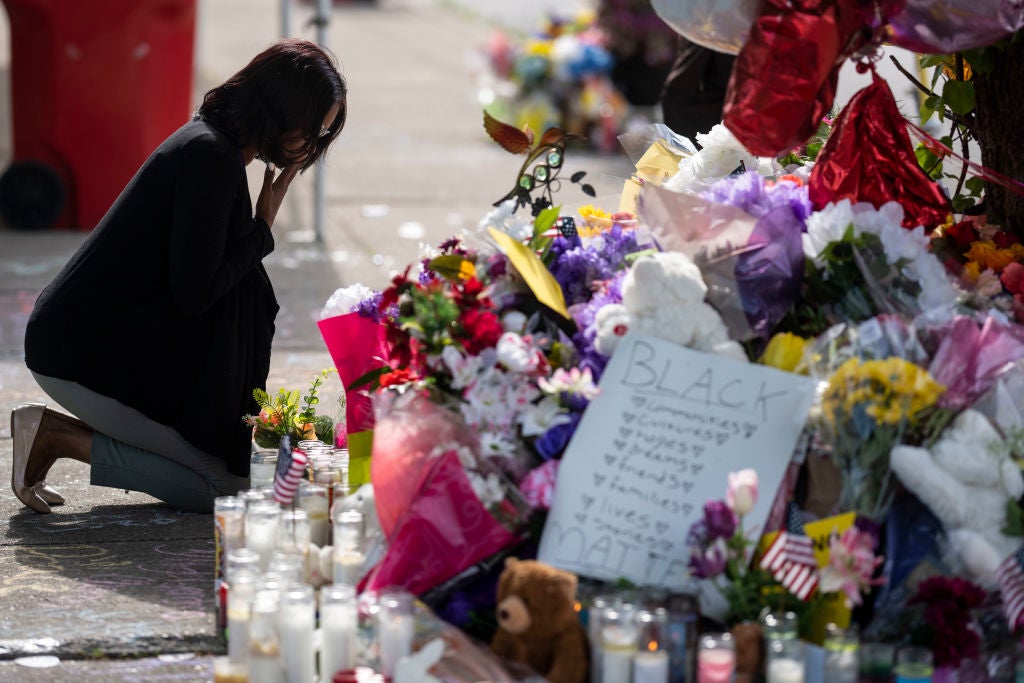
On March 25, it will have been two years since George Floyd was killed, his last moments caught on camera as former police officer and current Minnesota Correctional Facility prisoner Derek Chauvin kneeled on his neck. That video was shared worldwide, both inciting what many called a “racial reckoning” in 2020 and also painting a very clear picture of the Black experience in this country. It was a picture people hoped would help change things substantially when it comes to violence against Black people.
But as we approach that sad anniversary, we are grappling with the grief from the shooting that took place in Buffalo, New York this past weekend. Ten innocent Black people, many elders, were shot and killed while at the grocery store by a white supremacist fueled by the “replacement theory.” That same shooter, equipped with a rifle, was apprehended by police without incident.
So much for that reckoning.
From being targeted by police to being picked off by racists fearful of their place in a quickly diversifying nation, Black people are tired. Studies have shown that in the weeks following racial violence, the mental health of Black people is poorer than normal. But having to continue on with life, work, and the rearing of the next generation as hearts ache over atrocities aimed at people of color so often allows for little rest. That is chipping away at the mental well-being of many Black women and men — of all ages.
“Studies from colleagues (Bor et al., 2018; Tynes et al., 2019) show connections between racially motivated murders and youth depression, anxiety and trauma and adult mental health decline, including productivity at work,” says Riana Elyse Anderson, PhD, licensed clinical psychologist and assistant professor at the University of Michigan’s School of Public Health to ESSENCE. “That means that our day-to-day functioning is impacted by bearing witness to this incident. And for Buffalo residents in particular, this is exacerbated, either by increased fear for their own safety or grief over the loss of a loved one, neighbor, or their liberty.”
Others are being affected in ways that they may not notice. As these incidents become common stories on the news and social media, some find themselves desensitized to it. Without a second thought, harrowing videos like the livestream of the shooting in Tops supermarket recorded by the shooter, are viewed by some who are curious while they’re avoided at all costs by others looking to not be scarred further by anti-Black violence.
“In these incidents, our folks typically go one of two ways: 1) the pain doesn’t seem to decrease, and if we think about it, it’s good to still feel pain every time we see a community member taken too soon or 2) we begin to feel numb, which also makes sense because we have seen it so many times. Either way we feel, I want to encourage us to know it is okay,” Anderson says. “Feeling something lets us know we are still alive, while feeling nothing means we have borne witness to something that we should not way too many times. Both of these approaches are psychologically normal.”
While some of us quickly move forward, others feel the weight of these devastating incidents in a way that can bring about great anxiety or sadness. To protect one’s mental health in these times, Anderson says we have to be proactive. That includes knowing when to disconnect.
“Put the media down,” she says. “You do not have to relive the moment time and time again in every single case. This is not entertainment — these are our family members.”
And while you should disconnect from online and from all the headlines when you need to, it’s recommended that you connect with people who can help you express what you’re really going through in these times. In addition to that, use your voice via the ballot to bring about actionable change. All of these events are bigger than just one crazed madman. They are all enabled by polices in place.
“We clearly need legislators unafraid to tackle gun control and racial dialogue in schools,” she says, “so put those emotions to work by voting this year in small and large elections.”
However you need to, protect your peace. As we confront these realities, continue to try and handle COVID, which isolated many and affected us emotionally, and just manage our mental wellbeing in the everyday (where we deal with other tough issues that have nothing to do with these distressful events), we have to look after ourselves.
“Talk to friends, family members, and a professional about how you are feeling. It is Mental Health Awareness Month and if this is not the time to see a therapist, I don’t know when is,” Anderson adds. “Let’s make the commitment to engage in therapy so we can get our emotions off of our chest and out of our heads into a useable form.”